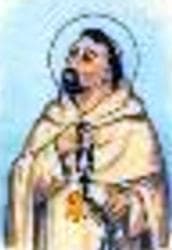
Blessed Diego Of Narbonne
Blessed
Feast Day: May 14
Biography
Blessed Diego of Narbonne was born in Spain to French immigrant parents. From a young age, he felt a strong calling to religious life and decided to join the Mercedarians, a religious order founded for the redemption of Christian captives from Muslim slavery.
Diego's deep devotion and holiness quickly became evident, and he soon started gaining attention for his miraculous acts. Such was his reputation as a miracle worker that he eventually chose to live a cloistered life at the El Puig monastery in Valencia, Spain, seeking a more contemplative existence.
However, his desire to help those suffering in captivity could not be contained within the monastery walls. Diego ventured to North Africa, where he dedicated himself to ransoming Christians who were held as slaves by Muslim captors. It is said that he successfully ransomed 108 Christians, liberating them from their oppressive conditions and returning them to their families.
Unfortunately, his heroic actions attracted the attention of local authorities, who saw him as a threat to their power. Diego was subsequently arrested, imprisoned, and subjected to various forms of torture in an attempt to make him renounce his Christian faith. Despite enduring physical brokenness and repeated floggings, he remained steadfast in his devotion to Christianity and refused to renounce his beliefs.
Eventually, Diego was released from captivity and returned to the El Puig monastery. He spent the remainder of his years as a choir monk, offering prayers and praises to God. His life was marked by unwavering faith, sacrifice, and a deep commitment to serving those in need.
When Diego passed away, he was interred near the main altar of the church at the convent of El Puig, where his memory and his devotion to the Christian faith continue to inspire believers. While specific details about his veneration and beatification are not provided, his legacy lives on as an example of steadfast faith, selflessness, and compassion. The May 14th feast day observed by the Mercedarians serves as a reminder of his dedication to liberating the oppressed and his unyielding commitment to Christ.